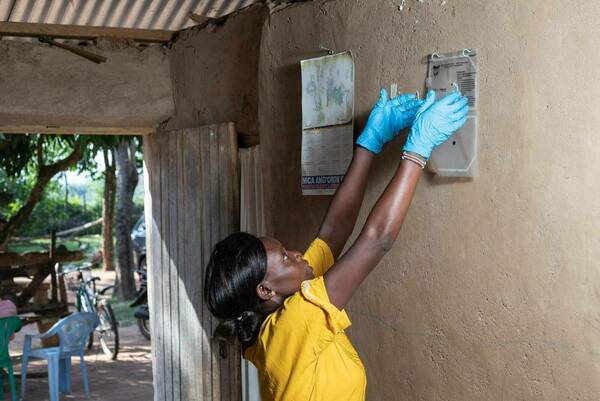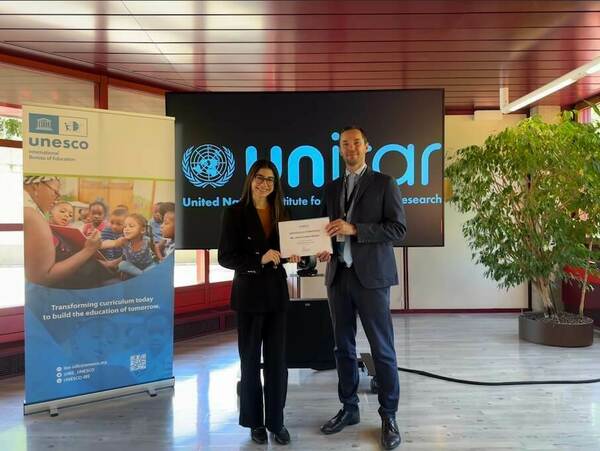Slavic and Eurasian studies professor wins Humboldt fellowship to research how Russia’s religious past shapes its present
When Russia invaded Ukraine on Feb. 24, 2022, Sean Griffin realized his second book needed a new title.
Griffin, an associate professor in the University of Notre Dame’s Department of German, Slavic, and Eurasian Studies, researches the history of the Russian Orthodox Church and its role in historical and present-day Russian politics. His second book was originally meant to focus on the memory politics of the church and its partnership with Vladimir Putin.

But he recognized that what he saw on the news that day — Patriarch Kirill of Moscow blessing Russian soldiers for battle — was a chilling new chapter in the story of Russian religion: the moment when the church was weaponized to justify the invasion.
Griffin’s observations of the past and present became Putin’s Holy War: Sacred Memory and the Russian Invasion of Ukraine, in which he explores the religious forces behind President Vladimir Putin’s 25-year reign and the invasion of Ukraine.
“I’m interested in liturgy, ritual, memory, identity — the stories, the myths, that imagined political communities tell themselves to make themselves and sustain themselves,” Griffin said.
In pursuit of that interest, his next book, tentatively titled “God is with Us: Liturgy and the History of Holy War in Russia and Ukraine,” will take on a grander scope to examine the role of liturgy over a millennium of Eastern Slavic history. Griffin will spend the 2025-26 academic year working on this project in Germany, supported by a research fellowship from the Alexander von Humboldt Foundation.
“Anytime you win a fellowship like this, it is like manna from heaven,” he said. “I was absolutely thrilled to learn that I won the Humboldt — arguably the most prestigious external research fellowship in Germany.”
The Humboldt fellowship brings experienced global researchers to Germany to collaborate with local institutions. Griffin will be sponsored by the University of Regensburg, a leader in the field of liturgical studies. The fellowship will give him the resources he needs to test his hypothesis.
Griffin posits that there is a consistent ideology of holy war in Slavic Eastern Europe rooted in the liturgical services of the Byzantine Empire. This theory provides him with a research path that connects key points in his career as well as the past and present. While his second book engaged with current conflicts, his first focused on the foundational passages of East Slavic history and traced them back to the stories prayed, chanted, and sung by the monks and clerics who chronicled the past.
“Even though a thousand years have passed, and empires have come and gone, and rulers have come and gone, and the geography and the languages of Europe have developed dramatically — one thing remains the same,” Griffin said. “And that is the famous silhouette of the onion dome churches.”
Griffin views liturgy within these churches as an imperial Roman political tool for the creation and control of cultural memory. Like typical Christian liturgy, Eastern Christian liturgy covers the life of Christ and his disciples, but it also promotes sacred narratives on subjects like Constantine the Great, the Roman Empire, and Prince Vladimir, the first Christian ruler of the first East Slavic state.
“A cynical Soviet historian said, ‘History is just politics tilted back into the past.’ That’s probably the thing that unites my three projects more than anything.”
- Sean Griffin, associate professor of Slavic and Eurasian studies
Some of those are myths about holy empires — and the holy wars they wage.
“Orthodox clergy have repeated the same story about holy war, and then that narrative flows out of the liturgy through the lips and sermons and speeches of the clergy into the ears of the politicians and the soldiers,” Griffin said.
The goal of his research is to excavate the ideology of holy war from within liturgical rituals and show how it has played out in Russian politics and culture, from the Baptism of Rus in 988 to the Russian invasion of Ukraine in 2022.
“We’ll see if it’s there,” he said. “I could be wrong; it’s a hypothesis.”
Assuming Griffin is on the right track, his research will expose a foundational continuity between the Russia of today and the Russia of a thousand years ago. Many people see themselves fundamentally separate from the medieval and premodern worlds, Griffin said, but the history of Russia shows these eras aren’t so different.
It’s the same sacred myths telling past and present Russians who they are, where they came from, and why they’re doing what they’re doing. And according to Griffin, every generation’s regime can manipulate these myths to fit their politics.
“A cynical Soviet historian said, ‘History is just politics tilted back into the past,’” Griffin said. “That’s probably the thing that unites my three projects more than anything.”
Originally published by at al.nd.edu on July 02, 2025. Republished at medieval.nd.edu on October 01, 2025.
Latest Research
- NSF Cyber SMART’s fall meeting shapes fifth year of project, legacy and future plans, and adds new memberThe U.S. National Science Foundation (NSF) Cyber SMART center gathered for its fall meeting on the University of Notre Dame campus this September. The meeting served as a checkpoint with progress reports and new projects from research leads and students…
- Notre Dame’s R.I.S.E. AI Conference builds interdisciplinary collaboration to inform human-centered artificial intelligenceAs artificial intelligence (AI) transforms nearly every sector of society — from healthcare and education to governance and global development — a critical question emerges: How can we conscientiously design and deploy these powerful technologies to positively impact society? This…
- University of Notre Dame joins the Global Coalition of Ukrainian StudiesThe University of Notre Dame has joined the Global Coalition of Ukrainian Studies after signing a Memorandum of Cooperation (MOC), formalized on September 24, 2025, at the Ukrainian Institute of America in New York City. Notre Dame joined four other American…
- The University of Notre Dame’s Mendoza College of Business and Industry Labs team up to inspire national security manufacturing competitiveness in the regionThe South Bend - Elkhart Region is full of manufacturing companies that are poised to grow, and Executive Master of Business Administration (EMBA) and Master of Business Administration (MBA) students at the University of Notre Dame are finding innovative ways to contribute to that growth. Earlier…
- Notre Dame research informs WHO conditional recommendation for spatial repellents in malaria vector controlThe World Health Organization (WHO) recently announced a “conditional recommendation” for spatial emanators, also known as “spatial repellents,” in the fight against malaria. This key determination was informed by spatial repellent studies that included the Advancing Evidence for the Global Implementation of Spatial Repellents (AEGIS) Project in Kenya, led by the University of Notre Dame and funded by Unitaid. The findings from this particular study were recently published in The Lancet.
- Walking the Halls of Global GovernanceOutside the Palais…













